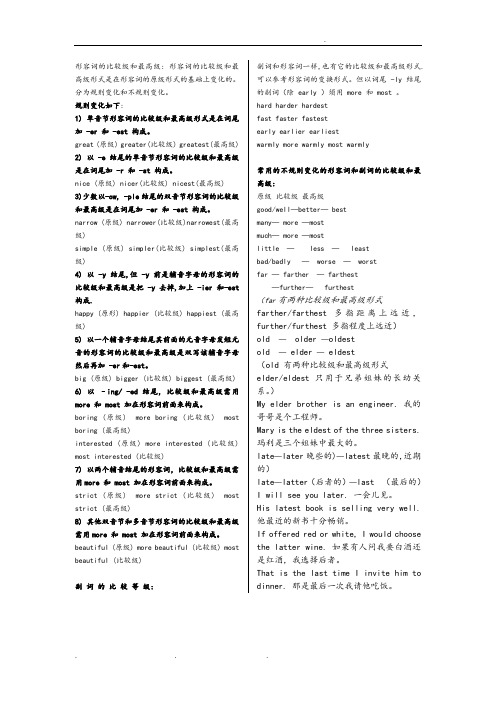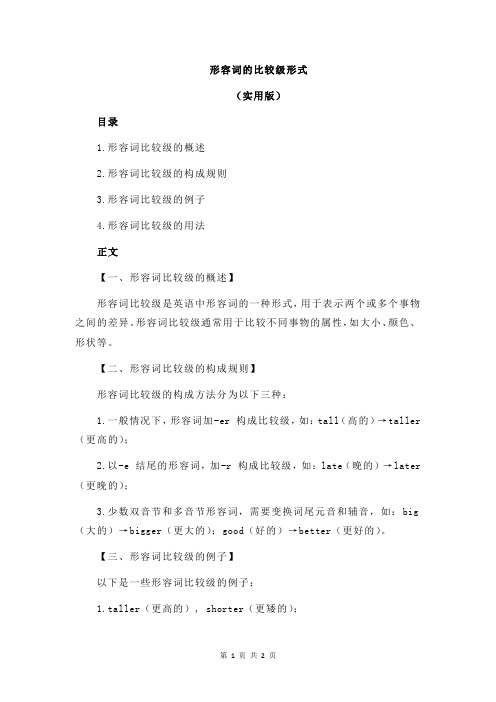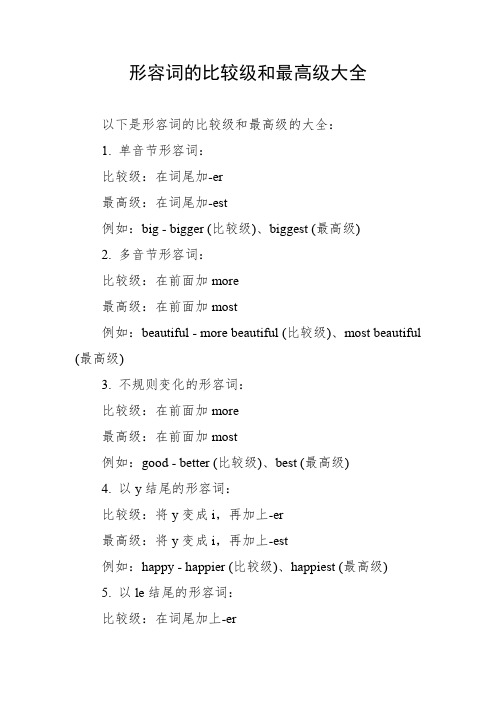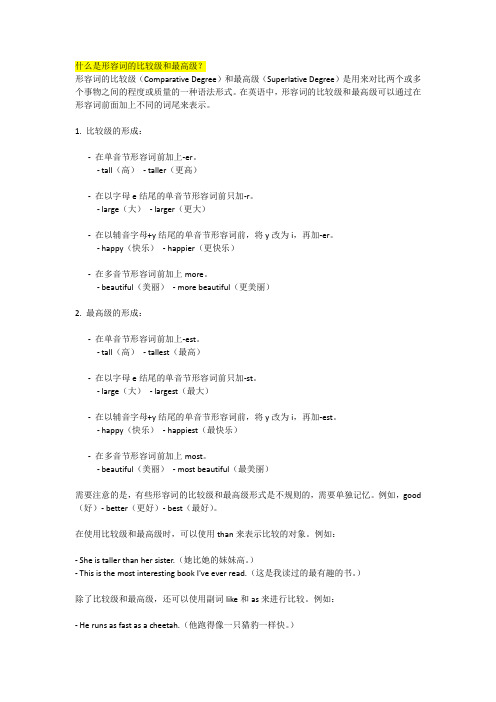形容词的比较级
形容词副词的比较级和最高级与用法

形容词的比较级和最高级: 形容词的比较级和最高级形式是在形容词的原级形式的基础上变化的。
分为规则变化和不规则变化。
规则变化如下:1) 单音节形容词的比较级和最高级形式是在词尾加 -er 和 -est 构成。
great (原级) greater(比较级) greatest(最高级) 2) 以 -e 结尾的单音节形容词的比较级和最高级是在词尾加 -r 和 -st 构成。
nice (原级) nicer(比较级) nicest(最高级)3)少数以-ow, -ple结尾的双音节形容词的比较级和最高级是在词尾加 -er 和 -est 构成。
narrow (原级) narrower(比较级)narrowest(最高级)simple (原级) simpler(比较级) simplest(最高级)4) 以 -y 结尾,但 -y 前是辅音字母的形容词的比较级和最高级是把 -y 去掉,加上 -ier 和-est 构成.happy (原形) happier (比较级) happiest (最高级)5) 以一个辅音字母结尾其前面的元音字母发短元音的形容词的比较级和最高级是双写该辅音字母然后再加 -er和-est。
big (原级) bigger (比较级) biggest (最高级) 6) 以–ing/ -ed结尾, 比较级和最高级需用more 和 most 加在形容词前面来构成。
boring (原级) more boring (比较级) most boring (最高级)interested (原级) more interested (比较级) most interested (比较级)7) 以两个辅音结尾的形容词,比较级和最高级需用more 和 most 加在形容词前面来构成。
strict (原级) more strict (比较级) most strict (最高级)8) 其他双音节和多音节形容词的比较级和最高级需用more 和 most 加在形容词前面来构成。
形容词的比较级形式

形容词的比较级形式(实用版)目录1.形容词比较级的概述2.形容词比较级的构成规则3.形容词比较级的例子4.形容词比较级的用法正文【一、形容词比较级的概述】形容词比较级是英语中形容词的一种形式,用于表示两个或多个事物之间的差异。
形容词比较级通常用于比较不同事物的属性,如大小、颜色、形状等。
【二、形容词比较级的构成规则】形容词比较级的构成方法分为以下三种:1.一般情况下,形容词加-er 构成比较级,如:tall(高的)→taller (更高的);2.以-e 结尾的形容词,加-r 构成比较级,如:late(晚的)→later (更晚的);3.少数双音节和多音节形容词,需要变换词尾元音和辅音,如:big (大的)→bigger(更大的);good(好的)→better(更好的)。
【三、形容词比较级的例子】以下是一些形容词比较级的例子:1.taller(更高的), shorter(更矮的);2.faster(更快的),slower(更慢的);3.stronger(更强的),weaker(更弱的);rger(更大的),smaller(更小的);5.brighter(更亮的),darker(更暗的)。
【四、形容词比较级的用法】形容词比较级通常用于以下三种情况:1.表示两者之间的比较,如:She is taller than her sister.(她比她妹妹高。
)2.表示三者或以上之间的比较,如:This book is the most interesting of the three.(这本书是三本中最有趣的。
)3.表示程度的加深,如:He is very tall.(他非常高。
形容词的比较级

形容词的比较级形容词是我们用来描述人、事、物的词语,而比较级则是用来表示两个或多个事物之间的程度、大小、数量等差异的词形变化形式。
形容词的比较级能够帮助我们更加准确地表达事物之间的差异,让我们来详细了解一下形容词的比较级以及它在表达中的应用。
一、形容词的比较级构成方式形容词的比较级通常有以下几种构成方式:1. 在形容词后面加上-er例如:- 大 -- 大的 (big -- bigger)- 快 -- 快的 (fast -- faster)- 高 -- 高的 (tall -- taller)2. 在形容词后面加上辅音字母+y,并将-y变为-i,然后再加上-er例如:- 漂亮 -- 更漂亮的 (pretty -- prettier)- 有趣 -- 更有趣的 (funny -- funnier)- 聪明 -- 更聪明的 (smart -- smarter)3. 在形容词前面加上more例如:- 有名 -- 更有名的 (famous -- more famous)- 幸福 -- 更幸福的 (happy -- more happy)- 美丽 -- 更美丽的 (beautiful -- more beautiful)注意:有些形容词的比较级是不规则的,它们的形式变化与一般规则不同,需要我们单独记忆和掌握,例如:- 好 -- 更好的 (good -- better)- 少 -- 更少的 (little -- less)- 多 -- 更多的 (much -- more)二、形容词的比较级的用法形容词的比较级在英语中有广泛的应用,下面列举一些常见的用法:1. 表示两个事物之间的程度、大小、数量等差异例如:- Tom比Mike更高。
(Tom is taller than Mike.)- 我的狗比你的狗更聪明。
(My dog is smarter than yours.)- 这本书比那本书更有趣。
(This book is funnier than that one.)2. 表示某个事物在同类事物中更具特征或特点例如:- 这家餐厅的服务比其他餐厅更好。
形容词比较级有以下几种变化形式

形容词比较级有以下几种变化形式1.形容词原形加-er,如tall---taller,short---shorter,long---longer,fast---faster,old---older,young---younger,small---smaller等。
2.以辅音字母加-y结尾的形容词,把y改成i,再加-er,如:heavy---heavier,happy---happier,funny---funnier等。
3.重读闭音节结尾的形容词末尾只有一个辅音字母,要双写末尾字母,再加-er,如fat---fatter,thin---thinner,big---bigger,hot---hotter等。
例如:太阳比月亮大。
The sun is bigger than the moon.今天比昨天更热。
Today is hotter than yesterday.4.多音节形容词的比较级要用more加形容词原形,如:beautiful---more beautiful,interesting---more interesting,delicious---more delicious,expensive---more expensive,exciting---more exciting等。
例如:这个钱包比那个更漂亮。
This wallet is more beautiful than that one.他的书比你的书更有意思。
His book is more interesting than yours.5.形容词比较级的不规则变化,如:good/well---better。
你的家人或朋友生病了,你可以说I hope you get better soon.希望您早日康复。
又如:bad---worse,如果你最近很忙,但是又遇到很多麻烦事,你可以说Things can’t be worse.真是糟糕透了!其他常见的不规则变化有:old---older/elder,much/many---more,little---less,far---farther/further。
形容词的比较级和最高级大全

形容词的比较级和最高级大全以下是形容词的比较级和最高级的大全:1. 单音节形容词:比较级:在词尾加-er最高级:在词尾加-est例如:big - bigger (比较级)、biggest (最高级)2. 多音节形容词:比较级:在前面加more最高级:在前面加most例如:beautiful - more beautiful (比较级)、most beautiful (最高级)3. 不规则变化的形容词:比较级:在前面加more最高级:在前面加most例如:good - better (比较级)、best (最高级)4. 以y结尾的形容词:比较级:将y变成i,再加上-er最高级:将y变成i,再加上-est例如:happy - happier (比较级)、happiest (最高级)5. 以le结尾的形容词:比较级:在词尾加上-er最高级:在词尾加上-est例如:possible - more possible (比较级)、most possible (最高级)6. 少数不规则变化的形容词:比较级:在前面加more最高级:在前面加most例如:famous - more famous (比较级)、most famous (最高级)7. 特殊的比较级和最高级:例如:well - better (比较级)、best (最高级)8. 副词的比较级和最高级:比较级:在后面加-er最高级:在后面加-est例如:slowly - more slowly (比较级)、most slowly (最高级)以上是常见的形容词的比较级和最高级,但是也有一些不规则变化的形容词需要记忆。
同时,需要注意的是,有些形容词没有比较级和最高级,如unique。
形容词的比较级和最高级

形容词的比较级和最高级形容词是一类用来描述名词或代词特征的词语,它可以用来表达事物的大小、高度、速度、程度等属性。
在英语中,形容词有三种级别:原级、比较级和最高级。
形容词的比较级和最高级可以用来对两个或多个事物进行比较,以表达它们在某种属性上的差异。
一、形容词的比较级形容词的比较级用来比较两个事物在某个属性上的大小、高度或程度。
一般来说,形容词的比较级可以通过在形容词前加上“-er”来构成。
如果形容词以“e”结尾,只需在后面加上“-r”;如果形容词以辅音字母加“y”结尾,则将“y”变为“i”,再加上“-er”。
例如:1. 高→ 高的→ 更高的(tall → taller)2. 大→ 大的→ 更大的(big → bigger)3. 漂亮→ 漂亮的→ 更漂亮的(beautiful → more beautiful)4. 智慧→ 智慧的→ 更智慧的(intelligent → more intelligent)如果形容词以重读闭音节结尾,且末尾只有一个辅音字母时,则需将最后一个辅音字母双写,并在后面加上“-er”。
例如:1. 适中→ 适中的→ 更适中的(fit → fitter)需要注意的是,有一些形容词的比较级是不规则的,需要单独记忆。
下面是一些常见的不规则比较级形式:1. 好→ 好的→ 更好的(good → better)2. 小→ 小的→ 更小的 (l ittle → less)3. 多→ 多的→ 更多的(many → more)4. 远→ 远的→ 更远的(far → farther/further)形容词的比较级在句子中一般用于比较两个事物之间的差异。
比较级可以与"than"搭配使用,构成比较结构。
例如:1. 这本书比那本书更有趣。
(This book is more interesting than that book.)2. 这座建筑物比那座建筑物高得多。
(This building is much tallerthan that building.)二、形容词的最高级形容词的最高级用来表达一组事物中某个属性的极限。
什么是形容词的比较级和最高级

什么是形容词的比较级和最高级?形容词的比较级(Comparative Degree)和最高级(Superlative Degree)是用来对比两个或多个事物之间的程度或质量的一种语法形式。
在英语中,形容词的比较级和最高级可以通过在形容词前面加上不同的词尾来表示。
1. 比较级的形成:-在单音节形容词前加上-er。
- tall(高)- taller(更高)-在以字母e结尾的单音节形容词前只加-r。
- large(大)- larger(更大)-在以辅音字母+y结尾的单音节形容词前,将y改为i,再加-er。
- happy(快乐)- happier(更快乐)-在多音节形容词前加上more。
- beautiful(美丽)- more beautiful(更美丽)2. 最高级的形成:-在单音节形容词前加上-est。
- tall(高)- tallest(最高)-在以字母e结尾的单音节形容词前只加-st。
- large(大)- largest(最大)-在以辅音字母+y结尾的单音节形容词前,将y改为i,再加-est。
- happy(快乐)- happiest(最快乐)-在多音节形容词前加上most。
- beautiful(美丽)- most beautiful(最美丽)需要注意的是,有些形容词的比较级和最高级形式是不规则的,需要单独记忆。
例如,good (好)- better(更好)- best(最好)。
在使用比较级和最高级时,可以使用than来表示比较的对象。
例如:- She is taller than her sister.(她比她的妹妹高。
)- This is the most interesting book I've ever read.(这是我读过的最有趣的书。
)除了比较级和最高级,还可以使用副词like和as来进行比较。
例如:- He runs as fast as a cheetah.(他跑得像一只猎豹一样快。
形容词比较级和最高级

形容词比较级和最高级形容词比较级和最高级用于比较两个或更多事物的特征或性质。
以下是形容词比较级和最高级的形式和用法:比较级的形式:1. 一般形容词的比较级在词尾加上-er,例如:taller(更高的)、faster(更快的)。
2. 以字母e结尾的形容词,在词尾加上-r,例如:nicer(更好的)。
3. 以辅音字母+元音+辅音字母结尾的单音节形容词,双写最后一个辅音字母,再加上-er,例如:bigger(更大的)。
4. 以重读闭音节结尾的双音节及多音节形容词,在词尾加上-er,例如:happier(更快乐的)。
最高级的形式:1. 一般形容词的最高级在词尾加上-est,例如:tallest(最高的)、fastest(最快的)。
2. 以字母e结尾的形容词,在词尾加上-st,例如:nicest(最好的)。
3. 以辅音字母+元音+辅音字母结尾的单音节形容词,双写最后一个辅音字母,再加上-est,例如:biggest(最大的)。
4. 以重读闭音节结尾的双音节及多音节形容词,在词尾加上-est,例如:happiest(最快乐的)。
注意事项:1. 有些形容词的比较级和最高级形式是不规则的,例如:good (better,best)、bad(worse,worst)。
2. 当形容词以-y结尾时,变为-i加-er或-i加-est,例如:funny (funnier,funniest)。
3. 对于很多双音节或多音节的形容词,可以在前面加上more (比较级)或most(最高级)来构建比较级或最高级形式,例如:beautiful(more beautiful,most beautiful)。
使用比较级和最高级时,常用的表达方式有:1. 比较级+than(比……更……):He is taller than his brother.(他比他兄弟更高。
)2. the+最高级+of(最……的……):She is the smartest student in the class.(她是班里最聪明的学生。
- 1、下载文档前请自行甄别文档内容的完整性,平台不提供额外的编辑、内容补充、找答案等附加服务。
- 2、"仅部分预览"的文档,不可在线预览部分如存在完整性等问题,可反馈申请退款(可完整预览的文档不适用该条件!)。
- 3、如文档侵犯您的权益,请联系客服反馈,我们会尽快为您处理(人工客服工作时间:9:00-18:30)。
形容词的比较级a dj的比较级和最高级的用法*形容词比较级和最高级的构成2. 不规则形式good /well-better-best(两)好bad /badly/ill-worse-worst 坏/病many /much-more-most(两)多little-less-least few-fewer-fewest 少far farther-farthest (距离远)old older-oldest (年长的)远further-furthest (程度深)老elder-eldest (资格老的*1. 表示同级比较,用“as+形容词原级+as”; “n ot as(so)+形容词原级+as”2. 表示两者的比较,用“形容词的比较级+than....”There are fewer hours of sunlight in winter than in summer. He is slimmer than I . She plays ping-pong better than I (do). (与主句相同的部分通常省略)3. 表示两者中较/更…的一个,用the+ 比较级,而且还用of the two, of the pair短语:John is the cleverer of the two boys. Of the two boys, John is the cleverer. The larger one of the two is my hometown. I have two sons, the fatter one is Max.4.比较级前用much, far, a lot, a bit, a little ,even, still, any来修饰。
表“..得多”,“甚至...”,“...一些”。
”This room is much brighter than that one.I?m spending a lot more time on English than before.5.倍数的表示,倍数+as+ 原极+as…Beijing is ten times as big as my hometown. This room is twice as big as mine.6. 用“比较级+and+比较级”的结构,译为“越来越…”The weather is getting colder and colder. The city is becoming more and more beautiful.7. 用“the+比较级,the +比较级”的结构,译为“越…(就)越… =if 从句The higher the ground, the cooler the air. The more , the betterThe harder you work, the more successful you will be8. 前后比较对象要一致.My news is more exciting than yoursThe climate of Kunming is better than that of Beijing.(√)The population of Shanghai is larger than that of Tianjin.比较对象是可数复数...than those/the ones...可数单数.... than that / the one..... 不可数名词....than that9.两者之间选择比较,用Which is + 比较级,A or B ? eg:Which is heavier, an elephant or a pig?10. 表示两者以上的比较,用“the+形容词最高级....+of (in, among…)...”或(that) I have ever done/seenThis is the happiest day in my life. Mary is the best singer in our class.This is the most difficult homework (that) I have ever done.in+团体/范围/项目。
如in China, in the world., in my class,in the competition among/of+参加比较的对象, 即个体名词复数形式。
of/among them(three)Of all the movies, I think this is the worst.Among them, Changsha is the nearest city to Guangzhou.11. the +adj最高级,有my/Tom’s等时,省略the.his ninth/ happiest birthday Tom?s best friend12. “one of the+最高级” 表示“最…之一”,形容词后的名词用复数形式。
Mr. Green is one of the most popular teacher s in our school.13. The+序数词+最高级:“第几最.....”Huanghe River is the second longest river in China. He is the third tallest boy in Class One.14. a/an+最高级, 表示“非常”的意思It is a most important question.16.用比较级表示最高级。
同一范围用:than any other +n的单数;than the other +n复数He is taller than any other student in his classHe is taller than the other students in his class. =He is the tallest student in his class. He is tall than any of the other students in......不是同一范围时找无other的选项Shanghai is bigger than any other city in China.Shanghai is bigger than any city in Japan17.less/least+adjA is less careful than B------B is more careful than AA is less expensive than B-----A is cheaper than B-----B is more expensive than A.定语从句1.定语从句:在复合句中,修饰某一名词或代词的从句叫做定语从句,被修饰的名词或代词叫做先行词,定语从句一般放在先行词的后面.e.g: Chen Guang Biao is the man who/that raises money to build schools.We should remember those days that/which we spent during the Olympic Games.有时,先行词与从句不是紧挨着。
E.g:He sent a message to me which said he was busy2.关系词: 引导定语从句的关联词称为...,关系词有关系代词和关系副词。
3.关系代词作用:①引导从句。
②代替主句中的先行词。
③在定语从句中充当一个句子成分,做宾语时可以省去。
4.关系代词: that(人/物), which(物), who(人), whom(人,宾格), whose(所有格), as等,没有what;关系代词在从句中作主语,宾语(可以省去),表语,定语等.It is about a man who/that falls in love with a woman when he travels on a ship.The place that/which you were born in is San Francisco.The person who/that took him abroad when you?re young was his uncle.Is the piano you are playing bought at the high price?5.关系副词: where, when, why等。
在从句中作地点状语where=in/ at/ on/ ... which,时间状语when=during/ on/ in/ ... which,原因状语why=for which等。
I still remember the room where I was born.I have to make marks in places where I have questions.Do you remember the afternoon when we met for the first time?6.注意点:1).先行词不能重复the book .This is the right book which Mr LI is looking for it.2).关系词在从句中做主语时,从句中谓语动词的单复数要视先行词的单复而定。
I hate people who talk too much but do little.I hate the man who talks too much but does little.He is one of the teenagers who / that are interested in flying.7. 关系代词用that的情况。
1).先行词是all, much, little, few, anything, everything, nothing , none, the one等不定代词时。
Is there anything (that )you want to buy in the shop?There?s not much that should be done right now.I did nothing that hurt you in the past.2).先行词被the only(唯一), the very(正是), the last等adv 修饰时。
